1. The Zululand Anti-Poaching Wing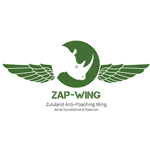
The Zululand Anti-Poaching Wing (ZAP-Wing) is a vital anti-poaching intervention and has contributed to numerous arrests and disruptions of poaching gangs.
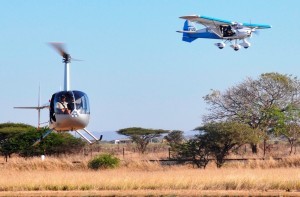 Established in 2012, ZAP-Wing is a public-private partnership between Project Rhino KZN & Ezemvelo KZN Wildlife. It provides daily helicopter reaction support and fixed-wing aerial surveillance to 26 state & private game reserves (+300,000ha) and to rhino security operations in northern KZN. 3 turbine helicopters are currently funded by KZN Provincial Government.
Established in 2012, ZAP-Wing is a public-private partnership between Project Rhino KZN & Ezemvelo KZN Wildlife. It provides daily helicopter reaction support and fixed-wing aerial surveillance to 26 state & private game reserves (+300,000ha) and to rhino security operations in northern KZN. 3 turbine helicopters are currently funded by KZN Provincial Government.
ZAP-Wing undertakes daily aerial patrols, assists rangers and APU teams in pursuit of poaching gangs, transports APU teams, SAPS and even K9 units into remote areas, investigates suspicious vehicles, notifies game reserves of unusual activities around their boundaries and helps to locate missing rhinos in difficult terrain. Its value also extends to other wildlife at risk of poaching, not just rhino. Benefit is also being seen from joint operations with law enforcement agencies.
Project Rhino is responsible for:
- The operating costs of the BushCat aircraft & pilot.
- Hluhluwe Airfield Anti-Poaching Ops Centre: a fully equipped, dedicated airfield base for ZAP-Wing and related state & private anti-poaching activities. It is also used as the Zululand command centre for Operation Rhino 7 – the national SAPS anti-poaching programme.
ZAP-Wing has been recognised at a national level for its proactive approach and numerous successes in preventing rhino poaching incidents.
2. Ranger & Reserve Support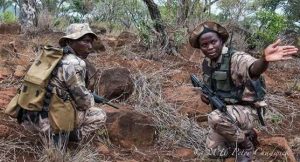
Field rangers and anti-poaching teams are the first line of defence in the rhino poaching war. They need ongoing support to maintain morale and improve their skills & abilities in the face of heavily armed poaching gangs.
1.Ranger Support: skills training & in-field mentorship. Over 100 rangers benefit annually from accredited ‘Counter Insurgency Tracker Training’ & ‘Section 49-Use of Force’ training, funded by Project Rhino KZN and in partnership with the Game Rangers Association of Africa and SA Wildlife College. In coming months we aim to intensify this support.
The current training programme includes:
1. 'Use of force': facilitated by the experienced Ed Ostrosky (Game Rangers Association of Africa) practically explains Section 41 of the SA Criminal Procedures Act. Includes combat/arrest techniques, drills on armed engagements and the legal processes around arrest and bail conditions.
2. 'Counter Insurgency Tracking Training (CITT)': 8-day in-field training provided by SA Wildlife Collage.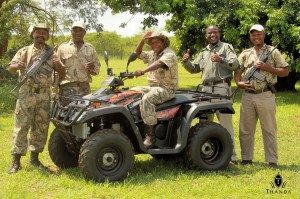
Extended Ranger Support: At the request of the reserve managers and where funding support is available, the following Ranger Support initiatives will be implemented in partnership with the Game Rangers Association of Africa and experienced conservation trainers.
3. 'Counter Poaching Awareness Training': for game reserve staff being puled into rhino security needs: eg: fence patrols, OP vigils and Guard Tower stints, how to respond to fence incursions and armed poaching gangs.
4. 'Field Ranger Mentorship': in-field ranger mentorship and assessment for game reserves.
5. 'Protected Area Integrity Management Effectiveness Assessments (PAIME)'.
6. 'Ranger well-being Psycho-social support': to rangers suffering from stress and PTSD.
2.Reserve Support: equipment & resources for private & community-owned game reserves, who are members of the Zululand & Midlands Wildlife Security networks, established by Project Rhino KZN to improve reserve-level communications and integrated responses to rhino poaching threats.
3. Project Rhino K9 Unit
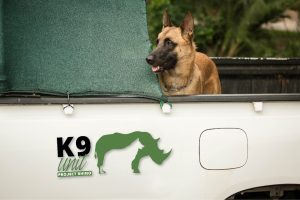 A new K9 unit, established by Project Rhino to stop wildlife crime, has immediately been put to work effectively in the Zululand district of KwaZulu-Natal, locating a number of carcasses of critically endangered white-backed vultures. Vultures are regularly poisoned for illegal use in the traditional medicine market, with population numbers plummeting in recent years. The carcasses were located near the town of Hluhluwe, an area at the centre of the wildlife conservation efforts in the province.
A new K9 unit, established by Project Rhino to stop wildlife crime, has immediately been put to work effectively in the Zululand district of KwaZulu-Natal, locating a number of carcasses of critically endangered white-backed vultures. Vultures are regularly poisoned for illegal use in the traditional medicine market, with population numbers plummeting in recent years. The carcasses were located near the town of Hluhluwe, an area at the centre of the wildlife conservation efforts in the province.
In just 3 weeks, the Project Rhino K9 Unit has been present at SAPS road blocks, reserve vehicle checks and night patrols.
“Dogs have proved to be an essential tool to fight wildlife crime by tracking down poachers, detecting wildlife products and recovering illegal weapons and ammunition. Project Rhino has been working towards implementing a dog unit that will service the needs of reserves, functioning effectively within the unique Zululand landscape. We hope to grow the team, using trained and certified tracking dogs to assist in tracking and locating suspects as well as gathering important intelligence.” says Chris Galliers, the Project Rhino coordinator.
If you would like to contribute to the funding of this project, or would like to assist with veterinary supplies or dog food – please visit this link or contact us. To watch a short video on the K9 Unit, click here.
4. Dehorning Initiative
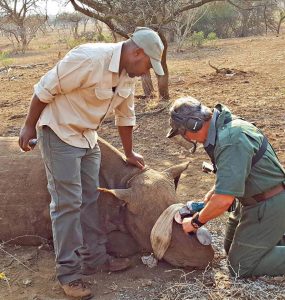
Project Rhino is also involved in the safe dehorning of rhino, an exercise which could very well save their lives. Although this is only a temporary measure, the intervention has shown positive results as poaching rates have declined in practiced reserves. Great care is taken to minimise stress to the rhino during, and after, the procedures.
You can find out more from this short informational video.
5. Horse Units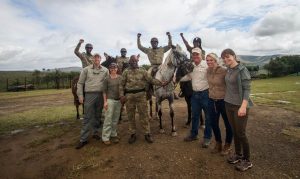
Project Rhino is equipping and supporting Horse Units at selected game reserves in KZN. These mounted rangers are able to patrol off-road and have a higher vantage point, helping them to see above the long summer grass. Horses are quiet and extend the daily patrol from 10km on foot to 30km on horseback. As a result, rangers are far less fatigued when contact with poachers is made. Response time is much shorter for a mounted ranger, thereby improving the chances of a poacher's apprehension before a rhino becomes a statistic. You can read more on the GlobalGiving page: Support Mounted Rangers Fighting Rhino Poaching
